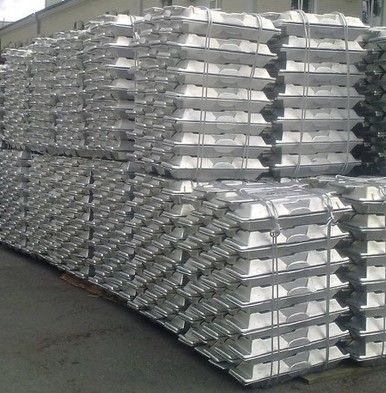A7 aluminium ingot: Unveiling the versatility in manufacturing
Team AL Circle
2023-12-22
Aluminium, a lightweight and corrosion-resistant metal, has emerged as a cornerstone material in various manufacturing sectors. Among its various forms, the A7 aluminium ingot stands out as a key player, showcasing exceptional characteristics contributing to its widespread use across diverse industries.
Characteristics of A7 aluminium ingots:
Purity and composition
A7 aluminium ingot is characterised by its high purity level, typically containing 99.7% aluminium. This purity is achieved through precise refining processes, ensuring minimal impurities.

Lightweight nature
Its lightweight nature makes it a crucial material in the automotive industry, where reducing vehicle weight is paramount for fuel efficiency and overall performance. Car manufacturers utilise A7 aluminium in the production of body panels, chassis components, and structural elements, contributing to the development of fuel-efficient and eco-friendly vehicles.
Corrosion resistance
Its exceptional corrosion resistance property finds application in marine and offshore industries. It is extensively used in the construction of ships, offshore platforms, and other maritime structures, where exposure to saltwater and harsh weather conditions demands materials with superior corrosion resistance.
Thermal conductivity
The high thermal conductivity of A7 aluminium is harnessed in the manufacturing of heat exchangers. These components play a crucial role in HVAC systems, refrigeration units, and industrial machinery, where efficient heat transfer is essential for optimal performance.
Malleability and formability
The malleability and formability of aluminium ingot make it a preferred material for extrusions and sheet metal applications. In the construction industry, it is widely used in the fabrication of window frames, roofing systems, and architectural components due to its ability to be easily shaped into complex designs.
Recyclability
Its recyclability is particularly advantageous in the packaging industry. Aluminium cans, made from recycled A7 aluminium, help reduce the environmental impact of packaging materials.
Electrical Conductivity
The excellent electrical conductivity of A7 aluminium ingot makes it an essential material in the electrical and electronics industries. It is used in the production of conductors, wiring, and electrical components.
Specific applications of A7 aluminium ingot
Automotive industry
Body panels: The A7 ingot variant is extensively used for manufacturing lightweight body panels, enhancing fuel efficiency and overall vehicle performance.
Chassis components: The material's high strength-to-weight ratio makes it ideal for producing sturdy and lightweight chassis components, contributing to improved handling and safety.
Structural elements: They are employed in the construction of structural elements, such as frames and supports, reducing the overall weight of vehicles without compromising strength.
Aerospace industry
Aircraft structures: They find application in the production of aircraft components, including fuselage sections, wings, and landing gear, where their lightweight nature is crucial for fuel efficiency.
Interior components: Its malleability allows for the creation of intricate interior components, such as seat frames and cabin fixtures.
Marine and offshore industries
Shipbuilding: Due to its exceptional corrosion resistance, A7 aluminium ingot is utilised in shipbuilding for constructing hulls, decks, and superstructures.
Offshore platforms: The material's corrosion-resistant properties make it a preferred choice for offshore platforms and oil rigs.
HVAC and refrigeration
Heat exchangers: Its high thermal conductivity is leveraged in the production of heat exchangers for HVAC systems and refrigeration units, ensuring efficient heat transfer.
Construction industry
Window frames: Its malleability and formability make A7 aluminium ingot suitable for manufacturing window frames, providing a durable and lightweight alternative to traditional materials.
Roofing systems: The material is used in roofing systems, contributing to the creation of lightweight and corrosion-resistant structures.
Packaging industry
Aluminium cans: Aluminium cans offer a sustainable and lightweight solution for beverage packaging.
Electrical and electronics industries
Conductors and wiring: It is a crucial material for the production of conductors and wiring in electrical systems.
Electronic components: The material is used in the manufacturing of various electronic components.
Consumer Goods
Household appliances: It is used in the production of household appliances as a lightweight and durable material for various applications.
Consumer electronics: Its use extends to the manufacturing of lightweight and high- performance devices.
A7 aluminium ingot: The driving force of modern industries
Recent innovations in A7 aluminium ingot focus on enhancing sustainability and performance. Advanced refining technologies and alloying methods aim to improve strength, durability, and recyclability. Innovations also explore novel applications in emerging industries, positioning A7 aluminium as a key player in cutting-edge and eco-friendly manufacturing solutions. Such innovations show how the A7 aluminium ingot is the driving force to build a sustainable future.
Categories
Raw Materials
Scrap
Consumables
Primary Aluminium
Secondary Aluminium
Equipment
Technology
Downstream Products
Finished Products
Utilities
Services
Others
Recent Blogs
Subscribe to newsletter
Connect with us












